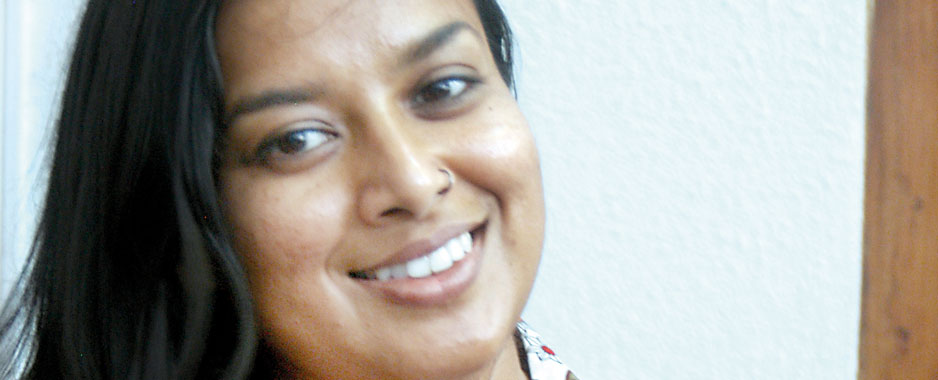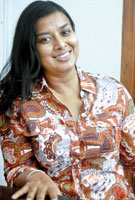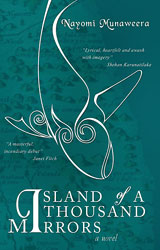Piecing together a thousand mirrors
View(s):A product of many cultures, Nayomi Munaweera shares the pain and the dilemma she underwent while writing her debut novel that was longlisted for last year’s Man Asian Literary Prize
By Smriti Daniel
Author of Island of a Thousand Mirrors, Nayomi Munaweera seems in equal parts amused and amazed that the first line in her debut novel has managed to generate so much fuss. The prologue opens on a couple, who’ve just finished making love. She’s still awake, he is asleep, her sister’s name on his lips. “I did not realise people would freak out so much about that,” she says, laughing. “It’s a metaphor. I have people asking, ‘oh my god, is this a threesome?’ I didn’t even really think about that. I didn’t realise people would take it so literally.”

When asked to consider the book, one of her first reviewers read the prologue and said simply, ‘No.’ Cajoled into reading further, he was drawn in and ended up writing a glowing review. In fact, Island of a Thousand Mirrors has found many new readers and admirers, particularly since it appeared as one of the 15 books on the longlist for last year’s Man Asian Literary Prize, placed alongside novels by Orhan Pamuk and Jeet Thayil.
The honour, for which Nayomi became eligible after Perera Hussein Publishing House added her to their stable of writers in 2012, has also got foreign publishers interested. She says: “Basically within two weeks of that I got an agent and people started returning my calls which wasn’t happening before.” Its publication has therefore been something of a life changing event for the author, who gambled on herself and her book 10 years ago when she abandoned a nearly complete PhD to start writing this instead. (In the meantime, she’s keeping her prologue as it is – “I kind of love it, this is the way it starts.”)
Born in Sri Lanka, brought up in Nigeria and the U.S.A, Nayomi is a child of many cultures. However, her enduring connection has been to Sri Lanka, a tie maintained by annual visits to the country in the company of her parents. A voracious reader, she never imagined though the possibility of a life devoted to writing. So she might have been the most surprised when she found that when it came down to writing her dissertation, it wasn’t what she really wanted to work on.
“I couldn’t do research, I couldn’t write. The thought that kept coming up was that I wanted to write this book.” However, the years of studying South Asian literature weren’t wasted. “I had this incredible base in literature, so I knew how it worked. That was my training. I was asking how is Salman Rushdie doing this? How is Arundhathi Roy doing this? How is Michael Ondaatje doing this? I was really paying attention in a way that even I didn’t fully understand.”
What her book would be though, she wasn’t entirely sure. She moved from Los Angeles to San Francisco and took up a job teaching English Literature and began writing in earnest. “I absolutely didn’t know what I was doing. It was this crazy leap of faith. I had no idea whether it would ever see the light of day. “

Nayomi: Happy with the end result of her debut novel. Pic by Nilan Maligaspe
The book has been in a constant state of evolution – Nayomi’s parallel and intense research propelling or birthing new storylines. The story pouring out of her rested on a net of complex, sometimes impossibly fraught relationships, each of which would be profoundly affected by the on-going civil war in Sri Lanka. “My whole point in writing the book was that beyond the politics and beyond all this horrific stuff that happened, there are these two groups of people that are intimately connected,” says Nayomi.
The author chose to tell the story through the eyes of two women – Saraswathi and Yasodhara – and through them to explore two ways in which their families responded to the terrible violence and betrayals of those years. One family flees the country, but eventually chooses to return, unable to deny the tug home still has on them. The other cannot leave. There is nowhere for them to go. Rooted in fact, the retelling of each fictional family’s path involved at times educated guessing, at others a willingness to immerse herself in deeply upsetting details.
Some of the book’s more harrowing scenes linger long after you have finished it; stomach churning and grief inducing by turns. The author is at her most potent in a scene depicting a murderous mob garlanding a boy and man with burning tyres and again when she writes about the rape of young girl by a group of soldiers. “I cried when writing those scenes,” she confesses, explaining that she learned a great deal from the writings of survivors of rape.
Though her research and the stories she heard helped in her attempt to reconstruct both, Nayomi also admits to struggling with the question of legitimacy – a feeling that she didn’t quite have the right to write about it. “I didn’t grow up here, I didn’t go through it. I struggled with that a lot,” she says.

It might have been why she didn’t fling herself wholeheartedly into the search for an American publisher. Having a Sri Lankan publisher just felt right even though she’s had to wait a decade. She’s found an editor she can trust in Michael Meyler – a particularly important relationship because she’s never been one to show her work to people.
“I didn’t take a workshop till 2011, until the book was about to come out,” she explains, adding that she didn’t even really tell anyone she was writing for the longest time. That didn’t mean that her trust in her own writing was implicit.
“Some days you’re like this is amazing, other days you’re like this is terrible, this is awful. No one should ever see it.” However, looking at the printed book with its green cover, she seems to have laid those doubts to rest. “I’m absolutely happy with it,” she says, affectionately patting the cover.
Nayomi, who is currently in Sri Lanka, is hard at work with Shyam Selvadurai on the Write to Reconcile project and will also be doing a reading at ICES on February 14 at 5:30 p.m.
Follow @timesonlinelk
comments powered by Disqus



















